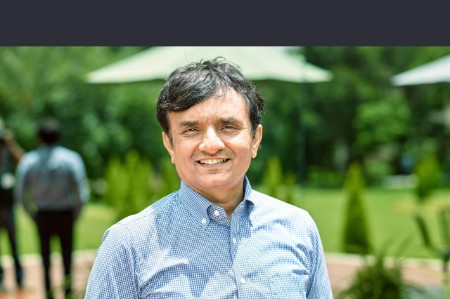He shelved his academic pursuits. “Since then, I have come a long way. I thought I would stay back for a year and assist Mr. Murthy. But it turned out to be such a good opportunity that I stayed on.”
After that he became the Executive Vice President of Strategic Operations, responsible for strategic planning, risk management, M&A and corporate marketing. Then, in 2015, he was appointed CFO, with responsibility for looking after M&A, investments and risk management, among other issues.
“It’s been a very satisfying journey for me,” he says. “I never imagined when I entered Infosys as a domain expert that one day I would rise to become its CFO. But that is the beauty of this organization. It stands for meritocracy.”
Everything has a financial outcome
Today, the CFO’s role has evolved considerably. “It is not limited to finance and accounts. Increasingly, CFOs are playing a central role in strategy formulation and execution,” says Mavinakere.
Ultimately, the outcome of corporate strategy is measured in financials, be it revenues, margins, earnings per share or the return on capital employed. And all risks – whether they relate to people, technology, HR or strategy – have a financial implication, he says.
As a result, the CFO and the finance organization must have an extraordinary view of the enterprise – a view that other function leaders cannot have. “We are in a better position to work with other business functions, to advise them, and to help them make the right strategic choices,” he adds.
In today’s world, technology has a huge impact on organizations. “Forget the CFO – every business leader in any industry has to be fully aware of how technology can change the market, as well as the internal processes of the organization.” And technology affects strategy: “You have to change the strategy in order to adapt to the new technology. We have to embrace technology, not just for cost-effectiveness, but for hygiene.”
Yet strategy is just the starting point. Given the finance team’s vantage point, providing timely information is extremely important, he says. Moreover, this information has to be predictive as well.
So the new-age CFO, according to Mavinakere, is someone who not only takes on the traditional roles of financial control, financial integrity, transparency, timely accounting, and checks and balances, but also has a 360-degree view of the business.
This helps in two ways, he explains. “First, it helps us challenge some of the business assumptions more confidently and emphatically. Second, it helps predict the financial impact of any business decision more accurately.” That’s because every decision, big or small, has either a profit-and-loss impact or a balance-sheet impact.
Motivating the team
In order to have a better understanding of the organization, Infosys inducts people from non-finance backgrounds into Mavinakere’s team.
“Our finance function does not have only chartered accountants,” he says. “For instance, we have a program manager who understands our IT and information system.” Moreover, he believes in giving people within the finance function different experiences. “People who join the taxation team are rotated. They may have to move to revenue recognition, for instance.”
Once they gain a better perspective on the organization, he motivates them to aspire to be the CFO of Infosys or some other company. “If you have to be the CFO, you must know all the processes of the organization,” he adds. He also believes in engaging the younger members of his team in decision-making.
One of the core expectations he sets for his team is to differentiate Infosys in the marketplace, while meeting all other objectives, such as compliance, transparency and financial integrity.
He says his biggest strength is his strong and competitive team, which is always ready to shoulder responsibility. “I am sure the challenges will only grow in the future, and that’s why I devote a lot of time to team development and engagement. I ensure I interact with every junior employee of the finance team, so that they are excited about their job.”
Changing mindsets
As Infosys is a tech company, the average age of the finance team is young – between 28 and 29. “The good thing is that they are tech savvy,” says Mavinakere, adding that mindset is more of a problem for team members who have been in the system for longer. “The ability of leaders to be open to change, to not be afraid of it and to adapt to it is the biggest and the most complex problem – not just for Infosys, but for any company.”
Just as a CFO needs to get a good perspective on the organization, so Mavinakere feels the business leader needs to understand the financial implications of all decisions undertaken. “Having said that, it’s very difficult to anticipate what is going to happen in the future,” he says. A “black swan” event can occur any time.
Thus, one of the biggest challenges facing CFOs and other C-suite leaders is the need to constantly question the status quo.


